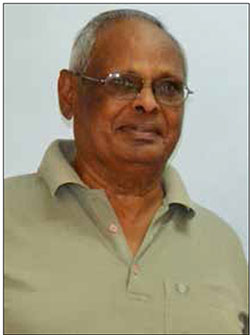Services on Demand
Article
Indicators
Related links
-
 Cited by Google
Cited by Google -
 Similars in Google
Similars in Google
Share
SAMJ: South African Medical Journal
On-line version ISSN 2078-5135
Print version ISSN 0256-9574
SAMJ, S. Afr. med. j. vol.106 n.8 Pretoria Aug. 2016
IZINDABA
Devanandan Chetty (1935 - 2015)

Deva Chetty's life vividly brings to mind the effects of apartheid and discrimination that he suffered, namely restriction of bursary funds, a separate graduation ceremony, salary discrepancies, and being appointed part-time head of an Indians-only hospital and not being allowed to examine white patients.
Deva matriculated in 1952 at the age of 16 years with a first-class pass. Coming from a very poor background, he applied for a bursary to do medicine at the University of Natal medical school. He was told by the Dean of the medical school that preference was given to black students regarding bursaries/loans, and that colonial Indians were given last preference. However, fortunately he was offered a bursary of £40 by the late V K Pillay Trust, which covered the cost of fees and books. In his 3rd year of medicine he was offered and accepted a government loan, which he had to pay back on qualifying as a doctor, on condition that he would never examine or treat white patients.
Deva qualified as a doctor in 1959, but did not attend the graduation because whites and non-whites had separate ceremonies. He specialised in obstetrics and gynaecology at the University of Natal and passed the MRCOG exams in London in 1966. He then took up the post of consultant lecturer in the department, and many well-known obstetricians and gynaecologists passed through his hands.
In 1968 there was a 'go-slow strike' because of salary discrepancies between white and non-white doctors. As a result, Deva resigned from government service with the intention of commencing private practice in Lorne Street, Durban, in 1969. He was told that he needed 3 months' notice to leave, as he was a lecturer, and not 1 month's notice. This condition would be waived if he accepted the post of part-time head of the Department of Obstetrics and Gynaecology at RK Khan Hospital, which had been built for the Indian community. He accepted this post, and served there until his retirement.
Deva was admitted as FRCOG in 1982. In 2009 he was given an award in recognition of his pioneering dedication and ethical contribution to the field of medicine by the Private Hospital Group (Joint Medical Holdings). On his retirement at the age of 75 years, his contribution to obstetrics and gynaecology was acknowledged and felicitated by the Durban Obstetricians and Gynaecologists Society, in recognition of his honesty and integrity and the assistance he had given to colleagues over the years. We will always remember him, especially for his humility, modesty, compassion and ethical practice of medicine.
Deva passed away peacefully on 28 November 2015. Our sincere condolences go to his family, especially his wife Mani, a retired radiographer, and his three children Theyagaraj, Krishnan and Kalesvaran.
May his soul rest in peace, and memories of him live on.
Siva Moodley
Chairman, Durban Obstetricians and Gynaecologists Society, and Council Member, South African Society of Obstetricans and Gynaecologists siva@ispace.co.za














